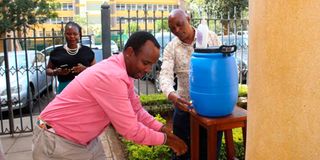Magistrate in Echesa case not suspended, judges’ group says

Magistrate Kenneth Cheruiyot washing his hands at the Milimani Law Courts. The Judiciary and a judges' lobby group have dismissed reports that he was suspended for acquitting former Sports CS Rashid Echesa in the Sh39 billion fake military arms tender scandal.
The Judiciary and a judges' lobby group have dismissed reports that a magistrate was suspended for acquitting former Sports Cabinet Secretary Rashid Echesa in the Sh39 billion fake military arms tender scandal.
Judiciary Chief Registrar Anne Amadi and Kenya Magistrates and Judges Association (KMJA) leader Derick Kutoh jointly said the magistrate, Kenneth Cheruiyot, is still on duty, contrary to the information circulating on social media.
The reports alleged that the magistrate was suspended after delivering the ruling at 7pm, past the court's operating hours.
But Ms Amadi said the reports were "not true", while Mr Kuttoh explained that he had spoken to the senior principal magistrate and confirmed that "he was at work discharging his duties".
The magistrate acquitted the former CS on the evening of December 3, ruling that prosecutors had failed to table evidence to allow the court to put him on his defence.
Fraud case
Mr Echesa faced charges related to fraud, conspiracy to commit a felony, making a document without authority, obtaining money by false pretence, attempting to commit a felony and uttering a false document.
Prosecutors also failed to provide key witnesses in the matter, such as two foreigners who were allegedly swindled of Sh11.5 million in the fake tender.
The foreigners were named as Kozlowski Stanley Bruno, the CEO of US-based ECO Advanced Technologies, and Egyptian national Mamdough Mostafa Amer Lofty.
The pair claimed that Mr Echesa and his co-accused duped them in the fake arms scandal.
The court also ruled that there was no proof that Mr Echesa was the source of the forged tender documents purported to be from the Kenya Defence Forces.
Another reason for Mr Echesa’s acquittal was that CCTV footage produced in court as evidence did not demonstrate the commission of any offence.
The footage only showed him arriving at Deputy President William Ruto’s office at Harambee House Annex alongside the two foreign nationals and leaving the premises.
His co-accused, Chrispin Odipo, was put on his defence for allegedly being in possession of instruments to commit forgery.
Arms supply deal
Mr Echesa was arrested in February last year after the two foreign gun dealers said they had lost Sh11.5 million in initial consultancy fees for the claimed arms supply deal. A further Sh50 million was to be paid later, investigators said.
The complainants reported that Mr Echesa had promised to use his influence to help them secure the Kenya Defence Forces multibillion-shilling security tender.
The Directorate of Criminal Investigations (DCI) said the tender documents were found in the former CS's car following a search after his arrest.
Mr Echesa is reported to have travelled to Poland to meet with the dealer as part of their negotiations. While in Poland, the former CS sampled the equipment at the dealer's company.
Though there were plans to meet Mr Ruto, that did not happen because in the last meeting, Mr Echesa stepped out of the office to answer a phone call only to come back and say that the DP was busy.
The controversial politician, who was sacked from his Cabinet position by President Kenyatta in March 2019, has had several run-ins with the law. The fake arms tender that prompted his second arrest in nine months followed his detention over the killings in Matungu.
In January 2019, the politician was accused of human trafficking after eight Pakistani and one Indian belly dancers, who were found at a club in Parklands without valid documents, were linked to him.
The dancers had been flown to Kenya through special permits issued to them by the former CS.
They were deported for engaging in activities outside what had been specified in their entry documents.





